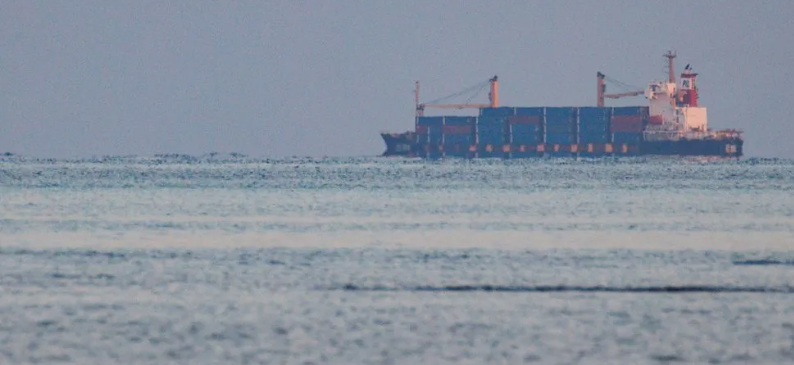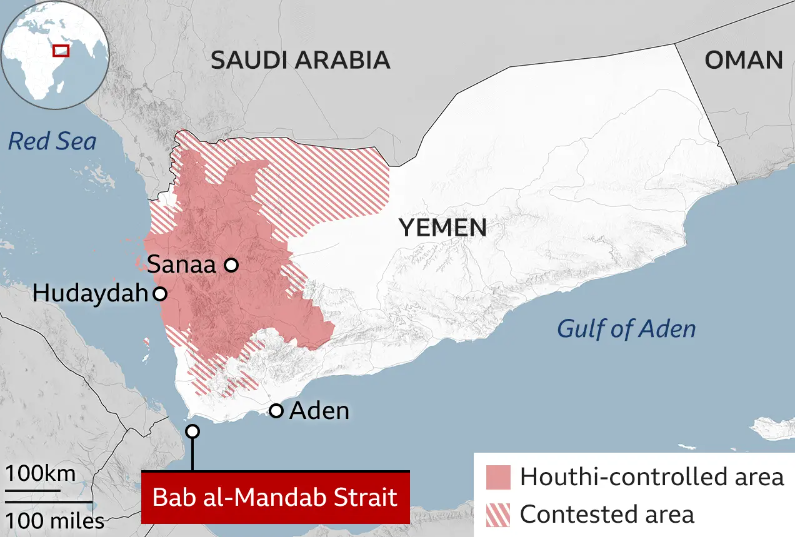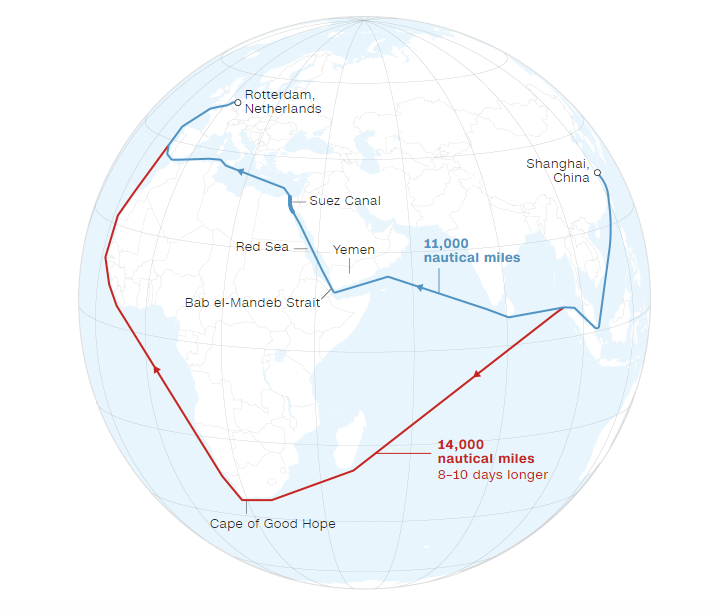Be your Logistics Department in China
Customized logistics solutions, your logistics expert in China
Customized logistics solutions, Shipping from China to the World
Tel:+8613424475220 Email:info@viputrans.com 
Let's talk about the latest situation in the Red Sea.
As the Red Sea crisis continues, the crisis now spreads far beyond the surface of the sea to the bottom of the sea. Even the water of the Red Sea cannot escape the disaster.
Recently, multiple organizations confirmed that at least four Asia-Europe communication cables passing through the Red Sea were damaged, directly affecting 25% of the data traffic between Asia and Europe.
Although the Houthi armed forces had previously issued threats to the Red Sea underwater cable on social media, after the cable was damaged, the Houthi armed forces issued a statement disclaiming responsibility.
The cargo ship "Rubi Mar", which was attacked by the Houthi armed forces, finally sank into the sea on March 2. Along with the cargo ship, tens of thousands of tons of fertilizers and a large amount of fuel oil sank into the sea, which caused another harm to the ecology of the Red Sea. A blow.
At the same time, the hot war on the sea seems to show no sign of stopping.
Niu Song, a researcher at the Institute of Middle East Studies at Shanghai International Studies University in China, said:
"The current Red Sea crisis is still ongoing. The continuous attacks by the United Kingdom and the United States on targets related to areas controlled by the Houthi armed forces in Yemen have not achieved the results they envisioned. The Red Sea waterways still face high security. risk.

Since late February, multiple telecom operators have reported serious problems connecting Asia and Europe. On March 4, Hong Kong telecommunications company HGC revealed that four cables were cut off under the Red Sea. 15% of Asia’s telecommunications traffic is transmitted westward, of which 80% requires the use of cables. Red Sea Cable.
The company said it was re-route to minimize disruption to customers. In addition to allocating westward transmission traffic to the remaining 11 Red Sea cables, a northern route from Hong Kong to Europe via mainland China and an eastern route from the United States to Europe will be opened.
Previously, damage to underwater communication cables was mostly caused by accidents caused by fishing boats trawling or navigation vessels anchoring. The responsibility for the destruction of communication cables is currently unclear. The Houthis reiterated on March 2 that they were not involved in the destruction.
Therefore, in the context of protracted regional conflicts, it is difficult to conduct a relatively objective investigation into this incident and draw a convincing conclusion.
This is not only the inevitable result of the deepening Red Sea crisis, but also the possibility that the parties involved in the incident are trying to "add fuel to the fire" of the Red Sea crisis.
It is worth noting that the cables damaged this time include the Asia-Africa-Europe 1 submarine cable system (AAE-1), which was put into commercial use in 2017 and connects Hong Kong, China to France. This submarine cable was initiated and led by China Unicom in 2012.
The African Submarine Cable Operator (Seacom), the owner of another cut cable, said it will be at least a month before repairs can begin, in part because of the need to apply for licenses from the Yemeni government and the Houthi armed forces at the same time.
Since the eastern part of the Red Sea where the incident occurred is controlled by the Yemeni government and the western part is controlled by the Yemeni Houthi armed forces, when laying cables, it is common to apply for permission from both parties at the same time to ensure safety.
In addition, operating in risky waters is costly and extremely dangerous, and the daily insurance cost for relevant vessels may be as high as US$150,000 (approximately RMB 1.08 million).
According to industry insiders, the Red Sea is one of the three most important cable intersections in the world. An estimated 17% of global internet traffic travels through underwater communications cables in the Red Sea.
Like international shipping logistics, this incident also highlights the fragility of global communications at a critical juncture.

In addition to testing global communications, the Red Sea crisis also has an irreparable negative impact on regional ecology.
On February 18, the Houthi armed forces attacked the "Rubi Mar" sailing in the Gulf of Aden with missiles, causing serious damage to the ship and forcing the crew to evacuate.
In the next 12 days, the cargo ship carrying tens of thousands of tons of fertilizers and a large amount of fuel oil has been anchored in the waters near Yemen and slowly taken on water. The leaked fuel formed a 30-kilometer-long oil strip on the sea surface.
On March 2, bad weather occurred in the waters near Yemen, and the "Rubi Mar" finally sank. This was the first time that a merchant ship was sunk by the Houthi armed forces in this round of attacks.
International environmental organizations and marine experts pointed out that the large amount of fertilizers carried by the "Rubimar" will seriously damage the ecological environment of the Red Sea and cause a heavy blow to fishing in waters near Yemen.
The former director of the Yemeni Public Administration for Environmental Protection pointed out that the fertilizer from the cargo ship will become a "catalyst for the growth of algae." The algae will form a dense covering on the water surface and coral reefs, causing the death of a large number of corals and affecting the biodiversity of nearby waters. Sex takes a huge toll.
The U.S. Central Command also issued a statement stating that the cargo carried by the "Rubi Mar" poses a huge threat to the Red Sea environment, and the sinking of the ship will also have a safety impact on ships traveling on this route. Saudi Arabia is worried that the oil pollution left by the ships may clog the desalination facilities it is building along the Red Sea coast.
After the current round of Palestinian-Israeli conflict broke out on October 7 last year, the Houthi movement frequently attacked Israeli-related ships in the Red Sea and waters near Yemen to show support for Palestine.
Nearly two months later, the situation remains unresolved. A spokesman for the Houthi movement in Yemen issued a statement saying that the Houthi movement used drones and missiles to attack two US Navy destroyers sailing in the Red Sea. He also said the Houthi movement would "not hesitate to expand attacks on all hostile targets."
The delay of the Red Sea crisis has greatly harmed the interests of regional countries, especially Egypt. The Chairman of the Suez Canal Authority revealed that the Suez Canal’s revenue has dropped by 50% since January. Affected by the tense situation in the Red Sea and the diversion of a large number of ships, the number of ships passing through the Suez Canal has dropped by 40%.
Tensions have led many international shipping companies to announce the suspension of Red Sea routes and instead detour around the southern tip of Africa.
It has previously been stated that although Egypt has introduced measures such as toll discounts to attract commercial ships, they are not enough to offset the safety concerns of shipping companies.
In the 2022-2023 fiscal year, Egypt will receive $9.4 billion in revenue from the Suez Canal.
Canal revenue is one of the main sources of Egypt's national fiscal revenue and foreign exchange reserves.

Previously, the Houthi movement said the attacks would only stop if Israel ceased fire and allowed humanitarian aid to flow unimpeded into the Gaza Strip.
The outside world expects that if there is a breakthrough in the recent Palestinian-Israeli peace talks, the situation in the Red Sea may be eased.
A new round of ceasefire negotiations in the Gaza Strip was held in the Egyptian capital Cairo on March 3. The Palestinian Islamic Resistance Movement (Hamas), the United States, Qatar and Egypt sent representatives to participate, but Israel did not send anyone.
Everyone hopes to reach a ceasefire agreement, but the prospect is not clear.
If you are interested in China import and export shipping services, please feel free to contact us.
Shawn.Liao(Mr.) Phone/Wechat/Whatsapp/Skype: +8618926970495
E-MAIL:sales04@viputrans.com
Copyright © 2003-2025 VIPU Supply Chain Logistics Co., Ltd. | All Rights Reserved
LOGISTICS | E-COMMERCIAL FULFILLMENT | ABOUT US | CASE | NEWS | VIDEO | CONTACT US
We will find the fastest or the cheapest way for your shipment. Please specify: where from, where to, what to ship.